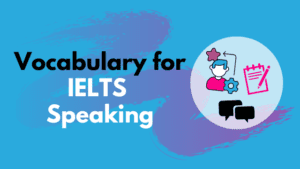👇 Take this lesson with you! 👇
Using some advanced vocabulary for IELTS is really important. Imagine yourself confidently using advanced vocabulary words like ‘ubiquitous’, ‘riveting’, and ‘meticulous’ in front of an IELTS examiner. Picture the examiner being amazed by your impressive vocabulary skills.
In this blog post, we will delve into ten advanced English words that can be a game changer for your IELTS test. By incorporating these words into your speaking and writing, you can enhance your score and impress the examiner. Let’s explore these words and learn how to use them effectively.
10 Advanced Words
Riveting
Let’s begin with the word ‘riveting‘ (adjective). This word refers to something that is extremely interesting and captures your full attention. It’s not about the sound a frog makes, but rather an experience that is captivating.
We can use it to describe, books, films, and even songs.
“The movie was so riveting that I forgot to eat my popcorn.”
Aversion
Our second word is the phrase ‘to have an aversion to‘ (verb). This phrase means to strongly dislike or have a repulsion towards something.
You can have an an aversion to activities, sports, food and many other things, such as getting up early, rock music, peanuts, spicy food, and so forth.
“I have an aversion to spiders. Can you blame me, though?”

Indulge
Unsurpassed
Moving on, we have the term ‘unsurpassed‘ (adjective), which describes something that is the best and cannot be surpassed or beaten.
We can talk about someone’s skills, knowledge, or even success as being unsurpassed.
“My grandmother’s apple pie is unsurpassed. No pie can beat granny’s!”
My take on this…
The phrase ‘my take on this…’ is a cool way to express your opinion on a particular matter.
- So when the examiner asks, ‘what do you think of ____?’
- You can just say, ‘My take on this is _____’
And the examiner will find your answer riveting…😉
“My take on the present economic situation is that the central bank should lower the rate of interest.”

Discrepancy
The word ‘discrepancy‘ (noun) refers to a difference between two things that should be the same.
We often talk about a discrepancy between what is expected and what is real, such as numbers, a result, or even money.
Likewise, we talk about a discrepancy between what people say, and what is real. For instance, if your girlfriend says ‘I love you’ but she goes out with her friends, without you, there’s a discrepancy between what she says, and what she does!
“There was a major discrepancy between my expected IELTS score and my real IELTS score.”
Futile
‘Futile‘ (adjective) describes something that is pointless, without effect, or a waste of time.
Efforts or attempts to do something can be futile. We often say,
- ‘I tried to ____ but it was futile.’
- ‘It’s futile to try and ____’
‘I tried to teach my wife to drive, but it was futile.’
Meticulous
‘Meticulous‘ (adjective) means paying great attention to detail.
Typically we use this to describe people, but we can also use it to describe a piece or writing, a piece of work or research, or even a plan.
“I think you are meticulous about your IELTS preparation, and that’s why you’re here!”

Pervasive
‘Pervasive‘ (adjective) describes something that is present or noticeable everywhere.
We can use this words to describe a number of things, such as,
- Adverts are pervasive on social media
- Corruption and crime is pervasive in some countries
- A theme or an idea in a book or film can be pervasive.
“The theme of friendship is pervasive in this book”
Ubiquitous
Lastly, ‘ubiquitous‘ (adjective) implies that something is found everywhere. It is similar to pervasive but may be even stronger.
“Olive oil is ubiquitous in Spain.”
By incorporating these ten advanced words into your vocabulary, you can greatly enhance your performance in the IELTS test. Practice using them in both your speaking and writing tasks. Remember to pay attention to pronunciation and usage to ensure you use them correctly.
With meticulous preparation and practice, these words will become as pervasive and ubiquitous in your English language skills as your love for the language itself. Embrace these words and make your IELTS test a riveting experience for the examiner.






4 thoughts on “10 Advanced Words to Improve your IELTS Score”
Thank you
the session was riveting
Awesome, glad you liked it, and pleased to seee you practicing!
Its really good information for me and those people who takes interest in spoken englisg or languages. Thank you very much for share this amazing blog.
So glad you like it!